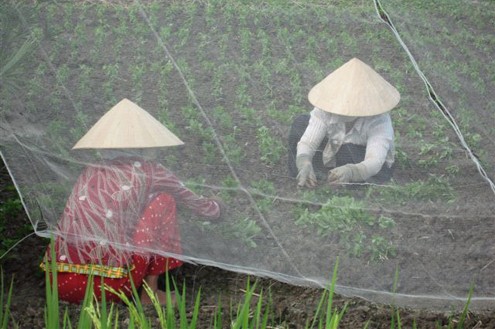 |
| (Photo: www.asiafoundation.org) |
(VOVworld) – Vietnam’s shifting into large-scale production of goods has challenged cooperatives to adapt to new market conditions, particularly during the new rural development process. VOV editor To Tuan reports.
To date, Vietnam has more than 9,200 agricultural cooperatives with approximately 7.3 million members. 70% of the cooperatives offer services. In the past, an agricultural cooperative meant the pooling of capital by farmers to offer services for farmers ranging from fertilizer and pesticide supplies, and farm work, to the collection, purchasing and distribution of products. Through cooperatives, farmers enjoyed service-based benefits at cheaper prices but cooperatives often had a cumbersome management apparatus. With the gradual modernization of the agricultural sector and rural areas, the previous model has proven less responsive to the market mechanism. Former Minister of Agriculture and Rural Development, Le Huy Ngo is now a consultant to the National Target Program on new rural development 'We need to improve awareness of the role, importance, and business value of agricultural cooperatives in the market economy and international integration. The new model should combine doing business and offering services to create profits for cooperative members. We should develop cooperatives that can expand their production and associate with the market, enterprises, and businessmen to protect their own interests and that of farmers. This will also help the national agricultural sector develop sustainably'.
The most basic difference of the new-style cooperative model according to the 2003 Law on cooperatives is that cooperative members, laborers in cooperatives, and the alliance of cooperatives have the authority to own production materials, and voluntarily pool their capital, labor, intelligence, and experience. Under the model, a cooperative economy is not in compatible with a private economy. In fact, it is a cooperation among various types of ownership in land use, assets, capital, and workforce. In recent years, the Vietnamese Government has promulgated policies to promote the development of cooperatives, such as by supporting loans. Nguyen Van Bien is Deputy Chair of the Vietnam Cooperatives Alliance saying ‘'The Government has planned to change people’s credit funds into cooperative banks. The establishment of this kind of bank will mobilize the involvement of all cooperatives while identifying the clients of these banks and helping cooperatives get easier access to loans.’.
Cooperatives have demonstrated their key role in the transfer of technologies in agricultural production, assistance to farmers, restructuring of crop plants and domestic animals, and stabilization and development of production. Cooperatives have also played an important role in the development of zoning master planning, and re-organization of production.